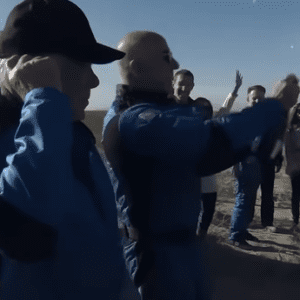
I had the good fortune of having a very long dinner with Gene Cernan about 15 years ago. He was the last man to walk on the moon. I asked him a slightly different question: “what was the biggest surprise once you realized you had landed on the moon?”
in the minutes before landing their entire focus was on maneuvering the LM. As the contact probes on three of its landers signaled touching the surface they cut the engine and fell the last few feet. There was radio chatter and some noises from the craft and then…silence…silence like nothing Cernan said he’d ever experienced before. It was then, he said, that the full enormity of what they’d done hit him.
I will directly quote a section of John Flavin’s excellent response to this same question, because it speaks directly to the question:
Apollo 11’s lunar module was running off course by a faster-than-planned descent, so the lunar module overshot the landing site by 4 miles into an area covered by boulders. Armstrong leveled off at 400 feet. According to astronaut Charlie Duke, monitoring events from Houston, “the LM was whizzing across the surface … It was far from what we had trained for and seen in the simulations.
So I started getting a little nervous, and they weren’t telling us what was wrong. It was just that they were flying this strange trajectory.” In fact, they were dangerously close to running out of fuel and literally flying for their lives.
I’ll reiterate: What the Apollo 11 astronauts saw that had them so shaken up were those boulders covering the area in which they were forced to land. They were off-course due to the LM’s separation from the Command Module taking place with a bit of residual air pressure in the docking adapter, which in effect gave the LM a slight push upon separation that translated into a four mile course error at the moon’s surface, taking them into that boulder field.
Neil Armstrong took manual control of the LM to maneuver to an area with fewer boulders while the LM computer was repeatedly issuing information processing faults, and finally landing with just seconds of fuel remaining in the landing stage.
Talk about a nailbiter.
I’m going to answer this from a personal perspective, because I’m the only person I know well enough to possibly understand what went through those gentlemen’s minds. Excuse the self-indulgence.
A couple of years ago, I did my first parachute jump. It was on the bucket list, and I needed to do it to prove something to myself.
But being me, I had to be different (that’s not my ego, by the way – it’s a pig-headed inclination to re-invent the wheel, just in case someone missed something the first time round), so instead of the usual tandem jump, with an instructor strapped to your back, I elected for a solo freefall.
I wanted the experience to be with me in control, not a passenger trip. This involved a couple of weekends training, so maybe 30 hours, on the ground, before the actual event. Not a lot compared with, say, the time it took me to learn to drive.
So, I’ve done my drills. They’ve not become muscle memory, so they’re not perfect every time, but they’re done and I think I know what I’m doing. I’ve got two instructors falling alongside me, so there is a failsafe. I have confidence in the people around me, and in the systems I am using, but I am aware that nothing is 100% guaranteed to work as advertised, and I am aware that I am the weakest link in the operation.
We go up in the little light aircraft, sitting tail-to-crotch with other students and instructors. Up and up, until we’re above the cotton candy clouds on the otherwise clear summer’s day. We reach around 12,000 feet (2 1/4 miles, or 3 1/2 km) and the door slides back.
It’s suddenly very cold, very windy and looking out, the ground is very far below! When my turn comes I crouch sideways in the doorway and look back into the cabin. My heart is racing and my body feels cold as adrenaline surges through it. I’m suddenly aware of how fragile and insignificant I am, and I am scared to death! We’ve already had a refusal by someone who had just experienced the same feelings as me, and as I look back at the half dozen or so faces watching me I am determined not to be another, not to miss this chance of a lifetime, not to let a moment’s emotional overload divert me from a goal I agreed with myself and worked toward, and not to embarrass myself in front of instructors and peers. It was a fight or flight moment.
I finished the count of three, and I jumped.
The shock of the wind stream hit me, and I literally couldn’t breathe. It reminded me of jumping into freezing water – an involuntary gasp that expels all the air from your lungs and leaves them incapable of drawing in more.
A split second later I sucked in air through gritted teeth, bared lips, and flapping cheeks. OK, breathing: check!
I looked down at the patchwork of fields and roads. Everything was familiar in a way, because I had seen the satellite images and I’d seen plenty of film taken from aircraft and by other parachutists, but nothing prepares you for the realisation that you are on a one way journey to meet that view, you have seconds to prevent that, and if it goes wrong, you are dead. I won’t lie – I was on the edge of panic. I have never been so terrified in my life!
Instructors prodded and pulled my limbs and helmet, encouraging me to adopt the correct reverse crab posture in order to stabilise my descent. Then a reminder to run through my drills – I’d completely blanked. Next, another reminder to look at my altimeter. I was not looking after myself at all, and I felt ashamed and emasculated – it was my life, and these people were effectively saving it for me.
The instructors indicated that it was time to deploy. I had seen the altimeter reading, so I realised, but it hadn’t sunk in. I had frozen. They pointed again, and I went straight to canopy release, forgetting to wave them clear: I just reached around and pulled the toggle.
Once the chute yanked me back to reality, I checked it was ‘there and square’ and then relief flooded through me. Sitting under that canopy on a beautiful summer afternoon was blissful. I could see for miles in every direction and I felt like a bird as I spiralled gently to Earth.
Steering, flaring, and landing was a breeze, and I’d happily repeat that part over and over. The jump though… nothing teaches you more about the value of life than to very nearly have it taken from you against your will.

So, if you are asking what shook the Apollo Moon-walkers up, my guess would be the crushing realisation of how dangerous the combination of mankind’s incredible fragility with our devil-may-care hubris can be.
They will have had confidence in the people at Mission Control back on Earth, and in the systems they were using to get them to the Moon and keep them alive there, but they would have been aware that nothing is 100% guaranteed to work as advertised, and aware that their chance of successfully making it back to Earth was only as strong as the weakest link in the chain. At any moment, in any Apollo mission, those guys were lucky to be alive.
Because at any moment they might not have been.






